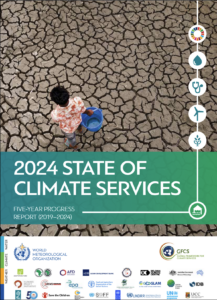Ireland has shown substantial progress in the provision and application of climate services over the past five years, according to the World Meteorological Organisation’s (WMO) 2024 State of Climate Services report, published today.
November 7th, 2024

2024 State of Climate Services report
The report includes deep dive analysis on how countries have succeeded in using climate services to deliver a range of socioeconomic benefits and advance climate action, with Ireland highlighted as an example of how to successfully establish a National Framework for Climate Services (NFCS).
The State of Climate Services report explains: “Met Éireann recognizes the importance of emphasizing quality assurance through monitoring and evaluation in the delivery of climate services. These efforts, alongside the successful implementation of plans to maintain momentum and funding, will ensure the sustainability and longevity of the initiative.”
Highlighting the Met Éireann-led TRANSLATE initiative, which aims to standardise future climate projections and develop services to aid climate risk decision-making, the report outlines how the formation of Ireland’s NFCS has played a central role in delivering impact-based climate information to inform multiple sectors and national policies.
This year’s report is based on contributions from worldwide partners, including major climate finance institutions, and The UN Office for Disaster Risk Reduction, and will be presented at COP29 in Baku, Azerbaijan later this month.
Climate services are the provision and use of climate data, information and knowledge to assist decision-making.
Ireland’s NFCS
Ireland’s NFCS was initially mandated by the Irish Government in 2022 and was established in 2023. The NFCS is led by Met Éireann and is a collaborative framework which brings all sectors of the Irish economy together and identifies their needs for climate services, co-develops tailored climate information products, and distributes these products to sectors and stakeholders to help them adapt to climate change. Though established relatively recently, the NFCS has taken a central role in delivering climate information to multiple sectors and is informing national government policy (e.g. the National Adaptation Framework).
The NFCS builds on the outcomes of the first TRANSLATE project, which produced high-resolution climate change projections for Ireland. TRANSLATE’s results indicate that Ireland is likely to get warmer and experience changes in rainfall as climate change continues. Extreme events (e.g. heavy rainfall, heatwaves) are likely to become more frequent and more intense, and these changes in climate will require sectors to prepare and adapt.
Ireland’s NFCS is already providing useful climate services and producing results for a variety of sectors of the economy, including the built environment and transport sectors where standards for constructing buildings and roads have been updated using future climate change projections. The NFCS also supplies accessible and functional climate data to support decision-making for stakeholders working with the water and flood sectors. Academic researchers in the agriculture and biodiversity sector meanwhile, are using TRANSLATE projections to run models on future grass and crop growth and are investigating the impact of climate change on the prevalence of agricultural pests.
More information on Ireland’s NFCS can be found on met.ie/NFCS. Details of how the NFCS is supporting sectoral adaptation plans can be found here. For climate change projections, please see the Data Explorer on ClimateIreland.ie. Queries can be sent to nfcs@met.ie.